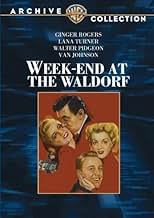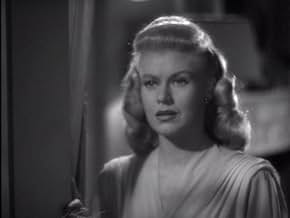NOTE IMDb
6,6/10
1,4 k
MA NOTE
Ajouter une intrigue dans votre langueThe misadventures of a group of diverse guests at the Waldorf Astoria hotel in Manhattan.The misadventures of a group of diverse guests at the Waldorf Astoria hotel in Manhattan.The misadventures of a group of diverse guests at the Waldorf Astoria hotel in Manhattan.
- Réalisation
- Scénario
- Casting principal
- Récompenses
- 5 victoires au total
Avis à la une
Pleasant reworking of Grand Hotel changes most of what made that film a classic but is entertaining enough on its own. For starters, the tone to this one is far different than Grand Hotel. This is a lighter film with more focus on romance and humor. The setting is changed as well as it is updated to WW2 America. The war figures heavily into several of the story lines. As with Grand Hotel, this is about various characters staying at a plush hotel and how their stories intertwine. The hotel here is the Waldorf-Astoria in New York. Most of the plots have been altered from the original but certain characteristics remain. Ginger Rogers plays a weary actress who falls for equally weary war correspondent Walter Pidgeon, believing him to be a jewel thief. Lana Turner is a stenographer who ponders boss Edward Arnold's "indecent proposal" while falling for bomber pilot Van Johnson. Other actors include Robert Benchley, George Zucco, Keenan Wynn, Samuel S. Hinds, and Leon Ames. Xavier Cugat plays himself and provides a little music. It's all watchable enough and even enjoyable, especially if you aren't nagged by comparisons to Grand Hotel. The cast is nice (except for an overacting Rosemary DeCamp) and the MGM production is classy as you might expect. It won't change your life but I highly doubt you'll regret watching it.
This film is a reworking of the plot from the magnificent GRAND HOTEL (1932). While both films were made by MGM, it really isn't fair to compare them, as there were many differences between them (all the many plots were changed or enormously reworked). Plus, GRAND HOTEL was so perfect that any film compared to it will no doubt be seen as a disappointment--but WEEKEND AT THE WALDORF was anything but a disappointment. There was enough fresh and new plot as well as excellence all around that I strongly advise viewers to watch them both and consider each a unique viewing experience.
While Walter Pidgeon, Ginger Rogers, Lana Turner, Edward Arnold and Lana Turner (among others) can't quite compare to the cast of GRAND HOTEL, this is still an amazing lineup of stars--even for the star-laden MGM. Plus, all the stars were at their best--thanks, in part, to exceptional writing and slick production values. Each of the subplots worked very well--particularly the one with Rogers and Pidgeon, as it made me laugh out loud many times! I could explain all the plots and critique each one, but other reviewers have already done this. The bottom line is that this film exudes quality and is highly entertaining. By the time the film is completed, you will no doubt feel quite content with the resolution of the film.
While Walter Pidgeon, Ginger Rogers, Lana Turner, Edward Arnold and Lana Turner (among others) can't quite compare to the cast of GRAND HOTEL, this is still an amazing lineup of stars--even for the star-laden MGM. Plus, all the stars were at their best--thanks, in part, to exceptional writing and slick production values. Each of the subplots worked very well--particularly the one with Rogers and Pidgeon, as it made me laugh out loud many times! I could explain all the plots and critique each one, but other reviewers have already done this. The bottom line is that this film exudes quality and is highly entertaining. By the time the film is completed, you will no doubt feel quite content with the resolution of the film.
The movie's best part, to me, is seeing the actual army of hotel workers required to keep a high-rise like the Waldorf operating. It's impressive, and sure a lot of free advertising. Anyway, despite the attractive cast, the various light comedy threads fail to gel, making the screen time seem longer than its actual 130 minutes. The movie adds up to bland entertainment, at best. The one sparkling scene is when Johnson's flight captain and Turner's working girl meet, some winsome chemistry there.
The screenplay, however, comes across as a rather clumsy patchwork, at best. For example, shady tycoon Edward Arnold is apparently up to no good (and with oil sheiks, no less), but we never find out more. And what's with Thaxter's role. It comes across like a half-digested morsel, maybe serving as a screen test for a younger MGM performer. Nor does Robert Leonard's uninspired direction help. In fact, it seems odd that the studio didn't assign a top- flight director to what would appear a prestige project.
The biggest disappointment, however, is with the Pigeon-Rogers romance. Now they're both highly capable, charming actors. The problem again is with the screenplay. Pigeon's impersonation of a jewel thief is, I gather, supposed to be zany and out of character. Instead, it comes across as not just implausible but also downright silly despite the pair's best comedic efforts. However, there is one compensation for Rogers— she gets to model an array of 1945's best high fashion, and lovely she is.
Anyway, the script looks to me like a rush job, comparing poorly with Grand Hotel's first-rate screenplay. Unfortunately, this version amounts to a general waste of superior talent, though I must admit coming away with a new appreciation of the boyish Johnson's acting talent. Too bad, some of that didn't better inspire the writers or at least give them more time.
The screenplay, however, comes across as a rather clumsy patchwork, at best. For example, shady tycoon Edward Arnold is apparently up to no good (and with oil sheiks, no less), but we never find out more. And what's with Thaxter's role. It comes across like a half-digested morsel, maybe serving as a screen test for a younger MGM performer. Nor does Robert Leonard's uninspired direction help. In fact, it seems odd that the studio didn't assign a top- flight director to what would appear a prestige project.
The biggest disappointment, however, is with the Pigeon-Rogers romance. Now they're both highly capable, charming actors. The problem again is with the screenplay. Pigeon's impersonation of a jewel thief is, I gather, supposed to be zany and out of character. Instead, it comes across as not just implausible but also downright silly despite the pair's best comedic efforts. However, there is one compensation for Rogers— she gets to model an array of 1945's best high fashion, and lovely she is.
Anyway, the script looks to me like a rush job, comparing poorly with Grand Hotel's first-rate screenplay. Unfortunately, this version amounts to a general waste of superior talent, though I must admit coming away with a new appreciation of the boyish Johnson's acting talent. Too bad, some of that didn't better inspire the writers or at least give them more time.
As in many movies made toward the end of World War Two, this film deals with some of the unpleasant effects on the personalities of those veterans who were part to the fighting. In this case, Captain James Hollis (Van Johnson) is amalgam of the troubled soldier: he needs an operation because of a fragment of shrapnel near his heart, he has no family, his friends were all killed in the war, and he is suffering from battle fatigue. This is all complicated in that he is seen as not having the "will to live." He is a hero looking for a long rest, hounded by a war correspondent. These images are quite different from those one finds in the propaganda films of 1940-1943. With victory in sight in 1945, the walking wounded needed help since battle shock was being recognized as a malady of warfare. As a film this is a fairly classy production, with good writing and a host of respectable actors in solid roles. Best of all, the film contrasts glamour on the homefront with the agony of soldiering. Week-ends may be short, but the lasting effect of this "Week-end at the Waldorf" echoes through the decades.
"Week-end at the Waldorf" was MGM's attempt to cash in on its earlier success "Grand Hotel" (made in 1932) by re-using the idea of Vicki Baum's play and setting it in wartime.
So the ballerina becomes the actress (Garbo becomes Ginger Rogers), the Baron becomes the war correspondent (John Barrymore becomes Walter Pidgeon), the sick worker becomes the Captain with a heart problem (Lionel Barrymore becomes Van Johnson), and there is still a stenographer (Joan Crawford becomes Lana Turner). In support is the ever reliable Keenan Wynn as an eager-beaver cub reporter.
Where "Grand Hotel" was star-led and rather stagey, with an improbable plot and an air of glamour, "Week-end ..." is somewhat less starry, more cinematic but dull, and lacks the 30s glamour which ran through the earlier film. Rogers does well enough as the bored actress who is waiting for her next film premiere, and Johnson and Pidgeon are personable enough, but Turner doesn't seem to have enough to do and the film, although watchable, feels a little flat.
Something of a pointless exercise, really, as the original film, overall, was much better.
So the ballerina becomes the actress (Garbo becomes Ginger Rogers), the Baron becomes the war correspondent (John Barrymore becomes Walter Pidgeon), the sick worker becomes the Captain with a heart problem (Lionel Barrymore becomes Van Johnson), and there is still a stenographer (Joan Crawford becomes Lana Turner). In support is the ever reliable Keenan Wynn as an eager-beaver cub reporter.
Where "Grand Hotel" was star-led and rather stagey, with an improbable plot and an air of glamour, "Week-end ..." is somewhat less starry, more cinematic but dull, and lacks the 30s glamour which ran through the earlier film. Rogers does well enough as the bored actress who is waiting for her next film premiere, and Johnson and Pidgeon are personable enough, but Turner doesn't seem to have enough to do and the film, although watchable, feels a little flat.
Something of a pointless exercise, really, as the original film, overall, was much better.
Le saviez-vous
- Anecdotes'The first "on location" movie filmed outside the Hollywood studios sets' according to a plaque at the Waldorf Astoria. The movie continually plays on a monitor near the registration desk at the Waldorf.
- GaffesWhile Chip and Irene argue at the breakfast table in her room, Chip is shown putting butter or jam on his toast with a knife in his right hand. In the next shot, Chip has his right hand in his pocket.
- Citations
Martin X. Edley: [open's hotel room door] Well, Angel Face, come into my parlor.
Bunny Smith: Yes, Mr Spider.
- Crédits fousThe opening cast credits display the principal roles by actor, character name and the character's occupation.
- ConnexionsReferenced in The Great Morgan (1946)
- Bandes originalesAnd There You Are
Music by Sammy Fain
Lyrics by Ted Koehler
Performed by Xavier Cugat and His Orchestra (uncredited) and sung by Bob Graham (uncredited)
Meilleurs choix
Connectez-vous pour évaluer et suivre la liste de favoris afin de recevoir des recommandations personnalisées
- How long is Week-End at the Waldorf?Alimenté par Alexa
Détails
- Date de sortie
- Pays d’origine
- Langues
- Aussi connu sous le nom de
- Week-End at the Waldorf
- Lieux de tournage
- Société de production
- Voir plus de crédits d'entreprise sur IMDbPro
Box-office
- Budget
- 2 561 000 $US (estimé)
- Durée
- 2h 10min(130 min)
- Couleur
- Rapport de forme
- 1.37 : 1
Contribuer à cette page
Suggérer une modification ou ajouter du contenu manquant











































